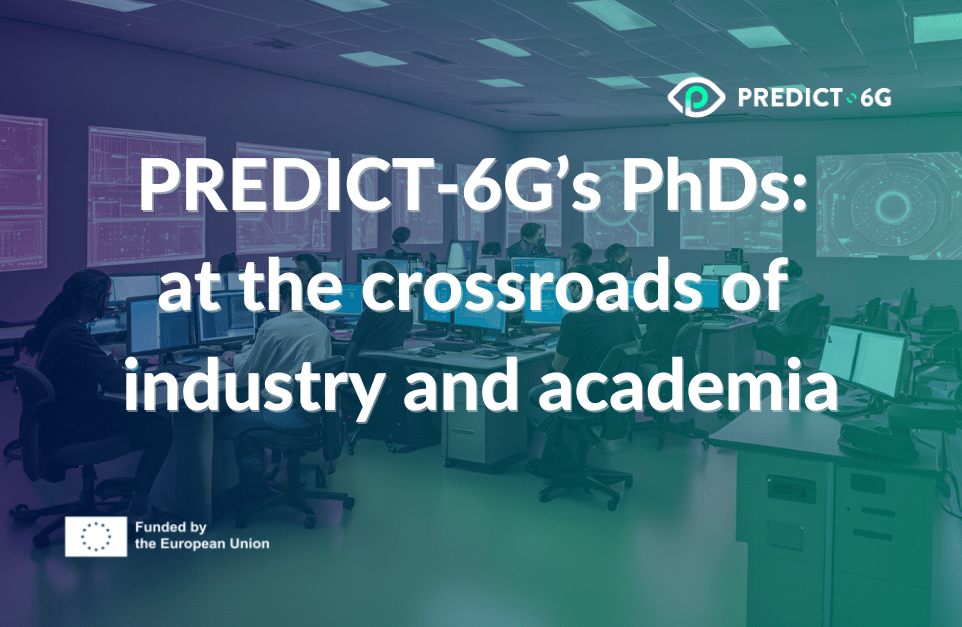In the rapidly changing world of technology, cooperation between academia and industry drives innovation and creates tangible societal benefits. The European Commission’s ‘New Codes of Practice for industry-academia co-creation and citizen engagement for knowledge valorisation‘ encourages collaboration between research institutions and businesses. The guidelines promote knowledge valorisation, knowledge transfer and co-creation, fostering an environment where innovative solutions can flourish. PhD students, at the intersection of deep academic knowledge and practical industry needs, play a pivotal role in bridging the gap.
PREDICT-6G nurtures a thriving research-industry collaboration, especially through the involvement of young researchers. As interviews with some of the PhD students involved in the project show, the experience can be transformative for them, offering them the opportunity to shape the future of technology participating in cutting-edge projects while at the same time perfecting their research skills.
Academia-Industry Collaboration: A Pathway for PhD Growth
For PhD students, participating in research projects involving academic and industrial partners brings unique benefits. As Alejandro Calvillo from UC3M, a PhD student in Service Management and Orchestration, notes, joint research offers “insights into the current situation of innovation in the industrial field” while helping researchers “focus ideas on real ground.” This real-world application of their work sharpens research goals and enhances students’ ability to think practically, solving challenges relevant to the industry.
David Rico, whose PhD focuses on time-sensitive networking (UC3M), echoes this sentiment, emphasising how PhD students bring “new and fresh energy” to projects, contributing innovative ideas while learning from industry veterans. For Rico, collaboration requires excellent communication skills, given the need to manage numerous relationships and timelines. He underlines that constant updates and communication between academic and industrial partners ensure that projects run smoothly and stay on track.
Beyond the technical and interpersonal skills gained, industry collaborations allow PhD students to see their research come to life in real-world scenarios. This is a crucial motivator for Marta Blanco, an industrial PhD candidate in Telematics (Telefónica), whose thesis on deterministic network solutions aligns with PREDICT-6G aim to develop a predictable and reliable 6G network. For Marta, working closely with industry provides valuable insights into the practical challenges that current research must address, shaping both her academic journey and the future of communications technology.
PhD Involvement in PREDICT-6G: A Case Study
The PREDICT-6G project is a prime example of how academia-industry partnerships can lead to technological breakthroughs, particularly in a fast-evolving field like 6G. PhD students, such as those involved in PREDICT-6G, play an essential role in driving research forward. Their work, guided by academic mentors and informed by industry needs, helps advance the project objectives while contributing directly to their doctoral research.
Alejandro Calvillo’s involvement in Work Package 3 (WP3), which merges AI concepts with the control plane, is closely related to his thesis on management orchestration. He describes his work in PREDICT-6G as an essential component of his research, allowing him to test orchestration strategies that will shape future network management. Similarly, PREDICT-6G has enabled David Rico, who contributes to Work Package 2 (WP2), to explore real-life applications of time-sensitive networks, ensuring his research is based on practical results.
Marta Blanco, whose thesis aligns directly with PREDICT-6 G’s goal of developing deterministic networks, values the project for providing her with in-depth knowledge of deterministic solutions. She is gaining experience not only through academic research but also by seeing how these solutions can be applied in industrial settings. She believes this practical experience will be an important asset as she moves forward in her career, opening up new avenues for research and collaboration.
All three PhD students – Alejandro, David and Marta – agree that participation in Horizon Europe projects such as PREDICT-6G will have a lasting impact on their academic and professional careers. They also stress the importance of encouraging more participation of PhD and postdocs in R&D projects, as young researchers bring new perspectives that can help achieve breakthroughs in 6G communication networks and other emerging fields.
If you want to stay updated about PREDICT-6Gt, subscribe to our newsletter and follow us on Twitter and LinkedIn!

